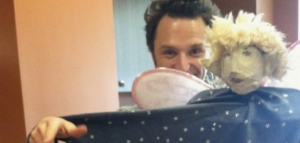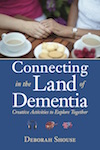Posts Tagged ‘puppetry’
The Power of Play in the Dementia Journey
 Josh Rice, a theatre maker and teaching artist, discovered the power of play in the dementia journey when he was still in graduate school. As part of a school project, he partnered with a senior living community on a therapeutic puppetry and improv-based program for people living with dementia.
Josh Rice, a theatre maker and teaching artist, discovered the power of play in the dementia journey when he was still in graduate school. As part of a school project, he partnered with a senior living community on a therapeutic puppetry and improv-based program for people living with dementia.
Together, Josh and the seniors designed and made puppets, and created performances that included songs, personal stories, and comedy. As he worked with the new artists, he noticed people were using their puppets to tell stories. They expressed emotions and they enjoyed the chance to play and have fun. Staff applauded the participants’ short-term memory gains and tactile improvements.
“Plus, we were creating exciting work and performing for people,” Josh says.
Puppetry
One afternoon, a woman who was having a difficult day burst into the puppetry classroom. She was non-verbal but acted out aggressively in a way that could have potentially agitated others. As Josh and the students were rehearsing, she walked in and before she could disrupt the class, Josh made eye contact with her, and gently touched her shoulder. He quietly talked to her and invited her to join in or sit and watch. Within minutes she calmed down.
 “I put a puppet in her hand and all of a sudden her language came back. It was like a switch had been turned on,” Josh says. This woman filled him with hope and inspired him. “I want people to understand that people who are living with dementia sometimes need us to be patient and keep giving them chances,” he says.
“I put a puppet in her hand and all of a sudden her language came back. It was like a switch had been turned on,” Josh says. This woman filled him with hope and inspired him. “I want people to understand that people who are living with dementia sometimes need us to be patient and keep giving them chances,” he says.
Being in the Moment
Josh knew the potential power of theatrical play and experimented with improv sessions for people living with dementia. The experiment worked.
“For improv, you have to listen and react,” Josh says. “The past or future doesn’t matter; it’s all about the present moment.”
He created a safe, nurturing, and creative atmosphere, offering structured improvisations, and invited his new improv team to play.
“They loved it and it was a thrill to watch them discovering new things and coming up with creative dialogues,” Josh says. “Play is an integral part of our lives and most of us need more of it.”


Art as a Creativity Catalyst: Featuring Grace and Spencer Townley-Lott

How do we keep our sense of connection and creativity through the caregiving journey? That was a question I often asked myself. I wanted to share this story of an extraordinary couple– artist, dementia advocate, and social worker Grace Townley-Lott and her husband, puppeteer, actor, and playwright, Spencer Townley-Lott. Both use art as a creativity catalyst in their work and throughout their lives.
Their elders inspired them. Grace and Spencer were teenagers when her grandmother and his great-grandmotherwere going through a dementia journey. The experience was difficult and impactful.
Grace became a social worker, specializing in older adults and learning how to communicate with people who were living with dementia, often through art.
“It’s incredible how the arts open people up,” Grace says. “Someone who hasn’t painted in 20 years picks up a brush and creates something beautiful. Someone who hasn’t spoken in ages delivers a zinger of a one-liner. Every day, I see how creative people are and the connections that are still possible.”
As Grace unfurled her work experiences, Spencer gained a new understanding of his great-grandmother’s last years. He used those insights to create a critically acclaimed play, Blossom. This play, which utilizes puppets, was funded by a Jim Henson Foundation Grant. It focuses on James Blossom, a retired painter who is living with dementia and his family’s changing relationships.
Caregivers often wonder: “How do we keep creativity alive?” Grace and Spencer were kind enough to share some ideas.
Engaging in New Endeavors: Grace
Try to be in the moment, despite your list of tasks. Respond to and validate emotions. Be willing to go with the flow so you can allow creative sparks.
Pay attention to facial expressions as you invite your loved one to engage. If you start dancing, do their eyes light up and do they laugh? If you offer watercolors and cue your partner to touch the brush to wet paper, does he respond with joy when the color blooms on the page? If you’re having a hard time getting your partner to take a shower, croon a song and waltz with him into the shower. If it doesn’t work, that’s okay, too! But if it does work, it’s a lovely and practical way to connect, create, and take care of physical needs as well.
Sometimes it takes reframing the situation to view the possibilities. An outside person or idea can often expand your thinking.
Creativity Tips for the Care Partner: Spencer
Sometimes, physical actions can help release tension to allow for more creative thinking. Deep breaths and stretching can help you loosen up at first. In the theater world, we start every rehearsal with a physical game or action to help us get focused and leave our stress at the door. Try wiggling and shaking your feet and hands, giving yourself a brief facial massage, stretching as tall as you can, and twisting gently left and right. You’re getting the blood flowing, leaving the worried part of you in the hallway, and getting ready to create.
Allow room for surprises. Try to set the tone by modeling joy and openness. Be willing to try again.
Connecting through Art: Grace
I love viewing art with people who have dementia. Art is so subjective, so there’s no wrong answer to the question, “What do you see?” You can take that first question and lead it along into a fascinating conversation, one question at a time, building a fulfilling conversation with an individual or a group.
In these art viewings, a discussion about a painting can tap into emotions that would otherwise be left undiscussed, or it could lead into a beautiful conversation about the person’s childhood, for example. You never know where the conversation will lead! This creates a failure-free situation where a person with dementia can excel and their answers are valued.
Connecting through Puppets: Spencer
Puppets offer a level of separation for the care partner. For people living with dementia, a puppet’s cues may be simpler to decode, dramatically expressing joy or sorrow. The puppet can place a hand on a shoulder and offer many opportunities for sensory engagement.
Puppets can also encourage intergenerational play, creating connections between family members who may be unsure who to communicate with their loved one with dementia.
Keeping Your Creative Flow: Spencer and Grace
“Creativity is inherent in all of us,” Spencer says. “It’s a muscle you can strengthen. Be patient with yourself. The first day, you can only do one push-up. The second day, you can accomplish two or three. That’s what creativity and artistry feels like. Start small. You are laying the foundation. And it gets easier.”
“Be present and be ready for anything,” Grace says. “By asking your loved ones for advice, truly listening to them, and just being with them, you can form beautiful interactions throughout life.”
To learn more about Spencer, visit
To learn more about Grace, visit
gracetownley.com and theartfuloven.com
Grace is the Director of Truly Inspired Outreach and Education for True Care Home Health.
Deborah Shouse is the author of Connecting in the Land of Dementia: Creative Activities to Explore Together and Love in the Land of Dementia: Finding Hope in the Caregiver’s Journey.

